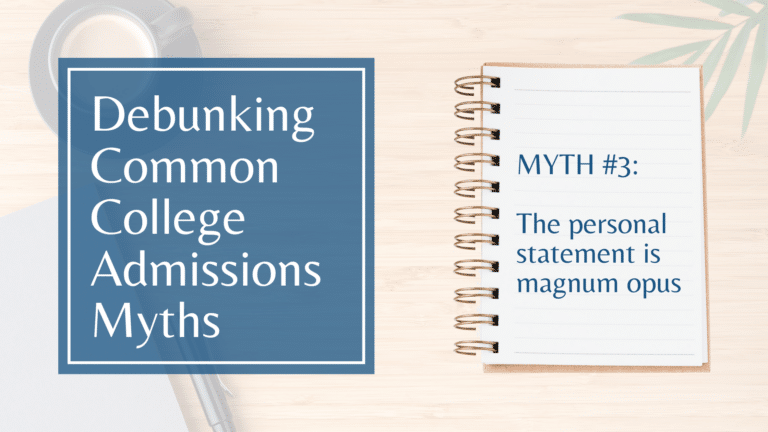Join Our Email List
Get the latest admissions tips and
announcements right in your inbox!
announcements right in your inbox!
We respect your privacy. Unsubscribe at any time.

The personal statement, often referred to as the “Common App essay” or “the college essay,” is a tremendously important part of a student’s application. This essay is an opportunity for students to infuse their personality and voice into their applications, adding a human dimension to the statistics and other information presented. The personal statement allows students to stand out from the crowd and to share a piece of themselves that showcases their individuality, insightfulness, and personality.
High school students are accustomed to addressing prompts in their writing, and the personal statement is no exception. However, the Common Application personal statement prompts are intentionally broad and are truly designed to prompt a student’s thinking rather than set forth specific parameters for the essay. The prompts encourage students to consider aspects of their lives, such as challenges, identities, and gratitude, that might give rise to a compelling essay. While the prompts are valuable starting points, we advise students not to worry about choosing a specific prompt until after they write their personal statement. Admissions officers are focused on the essay’s content, not the prompt it purports to address, and most essays can fit multiple prompts. If all else fails, students can choose the “catch-all” prompt—”Share an essay on a topic of your choice.”
The objective of the personal statement is for students to show the admissions readers who they are, why they are that way, and how they got there. It might be a narrative about a single transformative experience or a series of impactful anecdotes centered around a common theme. Ultimately, the personal statement should provide insight into what makes the student unique in a sea of applicants with similar grades, test scores, and activities. Ideally, the personal statement is so individualized that no one else could have written it. We advise students to imagine they dropped a printed copy of their essay on the floor of the school cafeteria with no name on it. If their friend picked it up and read it, would the friend be able to easily identify the author? If the answer is no, the student may want to keep digging for a truly personalized topic.
The goal of uniqueness is why certain subjects, such as service trips, summer camp, buzzer beaters, and ACL surgeries, are generally considered cliche essay topics. Of course, no topic is completely off limits, but students should challenge themselves to consider whether their experience is truly unique. If they can articulate how their camp experience, say, is different from that of their cabin mates, the experience might make for a good personal statement.
Students and parents must also understand what the personal statement is not. It is not a research paper, resume rehash, or a summary of information presented elsewhere in the application. This essay is not about what students do or what they know. It is also not a submission to a creative writing contest or the place to demonstrate that students know how to use a thesaurus—they should use language they actually use in their daily lives. Essentially, your personal statement is an opportunity for students to “come alive” in their applications as if they were speaking directly to the reader. This essay adds a human element to grades, test scores, and activities.
Students should also resist the temptation to present a sanitized version of their lives. Of course, the essay should demonstrate positive attributes the student will bring to a college campus. However, it’s also good to include “honest moments” reflecting areas for growth, an element all humans possess. Admissions officers will likely be impressed by students who can self-reflect, admit vulnerabilities, and demonstrate resilience. Well-intentioned parents often express concern that exposing imperfections will lead admissions officers to think that a student “has social problems” or “won’t be a good roommate.” But, admissions officers know that applicants are teenagers with real feelings and struggles and may, in fact, be suspicious of students who appear too “perfect.” In fact, in explaining how Duke University’s then-incoming Class of 2022 was chosen, Dean of Admissions Christoph Guttentag said, “You weren’t perfect. And, we didn’t expect you to be perfect. Perfect is kind of boring. Imperfect and striving is a lot more interesting.”
While the personal statement is tremendously important and deserves significant time and attention, many students struggle with letting go. Some obsess over whether their topic is “perfect” while others write and edit and rewrite to the point where their words are muddled and their meaning is lost. While it’s also helpful to solicit feedback on the essay, students should be wary of overinvolvement by well-meaning parents, teachers, and older siblings. When too many editors get involved, the student’s voice can easily get diluted, and admissions readers can easily spot the words of a middle-aged person attempting to sound like a teenager striving to conform to a preconceived idea of what colleges are seeking.
This single, 650-word essay, little more than a single-spaced page, may not be the crowning achievement of a student’s work as a writer, and that’s ok. The word limit and underlying purpose of the essay inherently constrain what students are able to achieve. Admissions officers are much more focused on the essay’s content than its diction and stylistic choices. They are not laboring over every word. Rather, they are reading quickly—some elite colleges review applications in eight minutes or fewer. Therefore, readers must be able to get the gist of the narrative and a sense of the student’s personality almost instantaneously. That’s why it’s critical for personal statements to be “user-friendly.” The reader should not have to work hard to understand your points or decipher your meaning through big words and sophisticated rhetorical devices.
The rise of artificial intelligence is changing the way they view essays entirely. In February, 2024, Duke University announced that it would no longer assign essays a numerical rating in its admissions process. Attributing the change to the increasing prevalence of generative artificial intelligence and professional essay assistance, Dean Guttentag explained, “Essays are very much part of our understanding of the applicant, we’re just no longer assuming that the essay is an accurate reflection of the student’s actual writing ability.” He added, “content and insight matter more than style.”
Nevertheless, every word of a student’s personal statement essay is important and deserves thoughtful consideration. Students should strive to craft an easily digestible narrative with a clear purpose that demonstrates one or more strengths about their character. The essay should be deliberately constructed, well-written, and carefully proofread. Once students have done so, it’s time to set the personal statement aside and move on to their supplemental essays and other parts of the application.
